

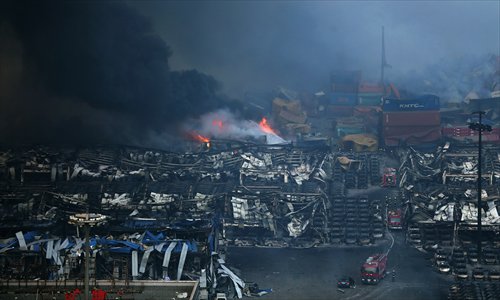 |
TIANJIN, Aug. 14 -- The death toll has risen to 56, including 21 firefighters, from massive warehouse explosions that hit north China's Tianjin City Wednesday night, local authorities said Friday.
Meanwhile, 721 others were hospitalized, including 25 critically wounded and 33 in serious condition, the rescue headquarters said.
A total of 44 people were rescued, said Zhou Tian, head of the city's fire department, after the two blasts happened at about 11:30 p.m. Wednesday following a fire in a warehouse for hazardous chemicals.
Firefighters have mostly extinguished the flames at the site, according to Zhou.
Zhou said more than 1,000 firefighters, including 232 from neighboring Hebei Province, were still at the site.
Du Lanping, a fire official with the Ministry of Public Security, said the blasts caused the highest death toll for firefighters from any single rescue mission since the founding of the People's Republic of China in 1949.
The high number of casualties has ignited public discussion over whether the servicemen were properly trained to deal with such a situation.
Lu Wei, an official from Tianjin fire department, said the firefighters did not know what was on fire. An explosion occurring soon after more firefighters arrived at the site left them no time to evacuate, said Zhou, explaining the heavy casualties.
Earlier, officials said water had been used to put out the flames.
Jin Xin, a professor with Beijing University of Chemical Technology, said if water was used to put out fire caused by sodium cyanide, a highly toxic material stored at the warehouse, it would create excessive levels of hydrogen cyanide, which is highly flammable.
The air near the site was below a safe standard on Friday evening, forcing firefighters and one command headquarter to temporarily vacate the site.
Earlier some monitoring stations detected toluene, chloroform, methylbenzene and volatile organic compounds, all hazardous pollutants, between Wednesday night and noon on Thursday, but their concentrations were decreasing and within normal range because of wind blowing toward the sea, said Feng Yinchang, an environmental expert.
Initial estimates say the blasts have affected 17,000 households, 1,700 enterprises and 675 commercial stores, said Zhang Ruigang, vice head of Tianjin Binhai New Area.
The city has opened 12 schools and 3 apartment buildings to accommodate 6,300 homeless residents, Zhang said.
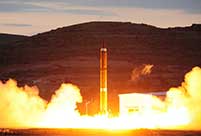 Striking moments when strategic missiles are launched
Striking moments when strategic missiles are launched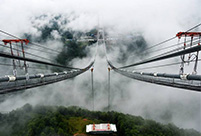 Construction on Asia’s biggest suspension bridge started
Construction on Asia’s biggest suspension bridge started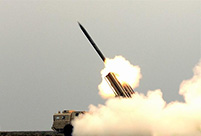 Impressive firing of China’s rocket artillery system
Impressive firing of China’s rocket artillery system Shocking scenes found in 4000-year-old earthquake relic
Shocking scenes found in 4000-year-old earthquake relic Female soldiers add color to military parades
Female soldiers add color to military parades Mums stage breastfeeding flash mob
Mums stage breastfeeding flash mob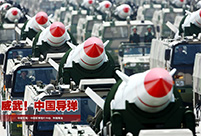 Awesome Chinese missiles
Awesome Chinese missiles Official shot having sex with two college girls
Official shot having sex with two college girls Moscow “spider-man” climbs Chinese skyscraper
Moscow “spider-man” climbs Chinese skyscraper After the blasts
After the blasts PC slump drags Lenovo down
PC slump drags Lenovo down Rein in carping queries in wake of blasts
Rein in carping queries in wake of blasts Police officers punished after prisoner sold drugs from behind bars
Police officers punished after prisoner sold drugs from behind barsDay|Week